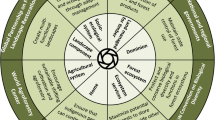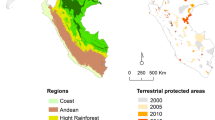Abstract
Forestry professionals’ perceptions of the risks and uncertainties associated with climate change were investigated in a questionnaire survey in south-west Germany. The respondents were employed in forestry in either public or private forests or working for state authorities. They were specifically asked about the related impacts of climate change on forest ecosystems, adaptive forest management and the potential of forestry to mitigate climate change. A factor analysis of the responses revealed significant variables explaining the major part of the variance and the key variable groups were identified in a canonical analysis. The majority of respondents (72 %) said they were under-informed, but most (83 %) view climate change as a reality, human-caused, and a significant risk. These forestry professionals were particularly concerned about extreme hazards, water scarcity, and changes in climatic zones. They generally said the potential of forestry to mitigate climate change is low, and saw few realistic measures like increased harvesting to substitute fossil fuels and energy-intensive materials for mitigation. Despite the uncertainty involved, adaptation strategies like using better-adapted tree species and provenances were mainly perceived as helpful, and tools such as spatially-explicit maps with recommendations for adapted species and indices of biotic and abiotic risks as important. The forestry professionals reported obtaining their information about climate change from advanced forestry training, the media, and scientific literature. The findings of the study are discussed in the light of the ongoing debate on climate change in Germany and recommendations made, including periodically checking and improving forestry professionals’ knowledge about climate change.

Similar content being viewed by others
References
Berrang-Ford L, Ford JD, Paterson J (2011) Are we adapting to climate change? Glob Environ Chang Human Policy Dimens 21:25–33
Blennow K, Olofsson E (2008) The probability of wind damage in forestry under a changed wind climate. Clim Chang 87:347–360
Blennow K, Persson J (2009) Climate change: motivation for taking measure to adapt. Glob Environ Chang 19:100–104
Blennow K, Persson J, Tomé M, Hanewinkel M (2012) Climate change: believing and seeing implies adapting. PLoS ONE 7(11):e50182
Blennow K, Persson E, Lindner M, Faias SP, Hanewinkel M (2014) Forest owner motivations and attitudes towards supplying biomass for energy in Europe. Biomass Bioenergy 67:223–230
Bolte A, Ammer C, Löf M, Madsen P, Nabuurs G-J, Schall P, Spathelf P, Rock J (2009a) Adaptive forest management in central Europe: climate change impacts, strategies and integrative concept. Scand J For Res 24:473–482
Bolte A, Eisenhauer D, Ehrhart HP, Groß J, Hanewinkel M, Kölling C, Profft I, Rohde M, Röhe M, Amereller K (2009b) Klimawandel und Forstwirtschaft - Übereinstimmungen und Unterschiede bei der Einschätzung der Anpassungsnotwendigkeiten und Anpassungsstrategien der Bundesländer. Landbauforschung - vTI Agric For Res 4(2009):259–268
Bonan GB (2008) Forests and climate change: forcings, feedbacks, and the climate benefits of forests. Science 320:1444–1449
Ciais P, Reichstein M, Viovy N, Granier A, Oge’ J, Allard VA, Buchmann MN, Bernhofer C, Carrara A, Chevallier F, De Noblet N, Friend A, Friedlingstein P, Grünwald T, Heinesch B, Keronen P, Knohl A, Krinner G, Loustau D, Manca G, Matteucci G, Miglietta F, Ourcival J, Papale D, Pilegaard K, Rambal S, Seufert G, Soussana J, Sanz M, Schulze ED, Vesala T, Valentini R (2005) Europe-wide reduction in primary productivity caused by the heat and drought in 2003. Nature 437:529–533
Crona B, Wutich A, Brewis A, Gartin M (2013) Perceptions of climate change: linking local and global perceptions through a cultural knowledge approach. Clim Chang 119:519–531
EpiData (2009) EpiData Software
forestDSS (2014) http://www.forestdss.org Community of Practice Forest Management Decision Support Systems - Accessed 07/2014
Hanewinkel M, Breidenbach J, Neeff T, Kublin E (2008) Seventy-seven years of natural disturbances in a mountain forest area - the influence of storm, snow, and insect damage analysed with a long-term time series. Can J For Res-Revue Canadienne De Recherche Forestiere 38:2249–2261
Hanewinkel M, Cullmann D, Michiels H (2010) Künftige Baumarteneignung für Fichte und Buche in Südwestdeutschland. Allgemeine Forstzeitschrift 65:30–33
Hanewinkel M, Cullmann DA, Schelhaas MJ, Nabuurs GJ, Zimmermann NE (2013) Climate change may cause severe loss in the economic value of European forest land. Nat Clim Chang 3:203–207
Heller NE, Zavaleta ES (2009) Biodiversity management in the face of climate change: a review of 22 years of recommendations. Biol Conserv 142:14–32
IPCC (2007) Climate Change 2007: The Physical Science Basis. Contribution of Working Group I to the Fourth Assessment Report of the Intergovernmental Panel on Climate Change. Cambridge University Press, Cambridge UK, and New York, NY, USA
Jactel H, Petit J, Desprez-Loustau M-L, Delzon S, Piou D, Battisti A, Koricheva J (2012) Drought effects on damage by forest insects and pathogens: a meta-analysis. Glob Chang Biol 18:267–276
Jansen M, Döring C, Ahrends B, Bolte A, Czajkowski T, Panferov O, Albert M, Spellmann H, Nagel J, Lemme H, Habermann M, Staupendahl K, Möhring B, Böcher M, Storch S, Krott M, Nuske R, Thiele J, Nieschulze J, Saborowski J, Beese F (2008) Anpassungsstrategien für eine nachhaltige Waldbewirtschaftung unter sich wandelnden Klimabedingungen - Entwicklung eines Entscheidungsunterstützungssystems Wald und Klimawandel (DSS-WuK). Forstarchiv 79:131–142
Kaplan S, Garrick BJ (1980) On The Quantitative Definition of Risk. Risk Anal 1:11–27
Kölling C, Dietz E, Falk W, Mellert K-H (2009) Provisorische Klima-Risikokarten als Planungshilfe für den klimagerechten Waldumbau in Bayern. Forst und Holz 64:40–47
Kolström M, Lindner M, Vilén T, Maroschek M, Seidl R, Lexer MJ, Netherer S, Kremer A, Delzon S, Barbati A, Marchetti M, Corona P (2011) Reviewing the science and implementation of climate change adaptation measures in European forestry. Forest 2:961–982
Kurz WA, Dymond CC, Stinson G, Rampley GJ, Neilson ET, Carroll AL, Ebata T, Safranyik L (2008) Mountain pine beetle and forest carbon feedback to climate change. Nature 452:987–990
Lawrence A, Marzano M (2014) Is the private forest sector adapting to climate change? A study of forest managers in north Wales. Ann For Sci 71:291–300
Lindner M, Maroschek M, Netherer S, Kremer A, Barbatie A, Garcia-Gonzalo J, Seidl R, Delzon S, Corona P, Kolström M, Lexer MJ, Marchetti M (2010) Climate change impacts, adaptive capacity, and vulnerability of European forest ecosystems. For Ecol Manag 259:698–709
Malmsheimer RW, Heffernan P, Brink S, Crandall D, Deneke F, Galik C, Gee E, Helms JA, McClure N, Mortimer M, Ruddell S, Smith M, Stewart J (2008) Forest management solutions for mitigating climate change in the United States. J For 106:115–117
MEA (2003) Ecosystems and Human Wellbeing: A Report of the Conceptual Framework Working Group of the Millenium Ecosystem Assessment. World Resoures Institute, Island Press, Washington, DC
Milad M, Schaich H, Bürgi M, Konold W (2011) Climate change and nature conservation in Central European forests: a review of consequences, concepts and challenges. For Ecol Manag 261:829–843
Nabuurs G-J, Lindner M, Verkerk PJ, Gunia K, Deda P, Michalak R, Grassi G (2013) First signs of carbon sink saturation in European forest biomass. Nat Clim Change 3:792–796
Papageorgiou K, Kassioumis K, Blioumis V, Christodoulou A (2005) Linking quality of life and forest values in rural areas: an exploratory study of stakeholder perspectives in the rural community of Konitsa, Greece. Forestry 78:485–499
Pregernig M (2001) Values of forestry professionals and their implications for the applicability of policy instruments. Scand J For Res 16:278–288
Rammer W, Schauflinger C, Vacik H, Palma J, Garcia-Gonzalo J, Borges J, Lexer MJ (2013) Chapter X: a web-based ToolBox approach to support adaptive forest management under climate change. In: Fitzgerald J, Lindner M (eds) Adapting to climate change in European forests – Results of the MOTIVE project. Pensoft, Sofia, pp 93–100
Reyer C, Lasch-Born P, Suckow F, Gutsch M, Murawski A, Pilz T (2014) Projections of regional changes in forest net primary productivity for different tree species in Europe driven by climate change and carbon dioxide. Ann For Sci 71:211–225
Sathre R, O’Connor J (2010) Meta-analysis of greenhouse gas displacement factors of wood product substitution. Environ Sci Pol 13:104–114
Schmidt M, Hanewinkel M, Kändler G, Kublin E, Kohnle U (2010) An inventory-based approach for modeling single tree storm damage - experiences with the winter storm 1999 in southwestern Germany. Can J For Res 40:1636–1652
Seidl R, Rammer W, Lexer MJ (2011) Adaptation options to reduce climate change vulnerability of sustainable forest management in the Austrian Alps. Can J For Res 41:694–706
Seppälä R, Buck A, Katila P (2009) Adaptation of Forests and People to Climate Change – A Global Assessment Report. Prepared by the Global Forest Expert Panel on Adaptation of Forests to Climate Change. UFRO World Series, Helsinki
Spathelf P, van der Maaten E, van der Maaten-Theunissen M, Campioli M, Dobrowolska D (2014) Climate change impacts in European forests: the expert views of local observers. Ann For Sci 71:131–137
Spiecker H (2003) Silvicultural management in maintaining biodiversity and resistance of forests in Europe-temperate zone. J Environ Manag 67:55–65
Spittlehouse DL, Stewart RB (2003) Adaptation to climate change in forest management. BC J Ecosyst Manag 4:1–11
Taylor A, Bruine de Bruin W, Dessai S (2014) Climate change beliefs and perceptions of weather-related changes in the United Kingdom. Risk Anal. doi:10.1111/risa.12234
Thuiller W, Lavergne S, Roquet C, Boulangeat I, Lafourcade B, Araujo M (2011) Consequences of climate change on the tree of life in Europe. Nature 470:531–534
Vagias-Wade M (2006) Likert-type scale response anchors. Clemson International Institute for Tourism & Research Development, Department of Parks, Recreation and Tourism Management. Clemson University
Volney WJA, Fleming RA (2000) Climate change and impacts of boreal forest insects. Agric Ecosyst Environ 82:283–294
Williamson TB, Parkins JR, McFarlane BL (2005) Perceptions of climate change forest-based risk to forest ecosystems and communities. For Chron 81:710–716
Winkel G, Gleißner J, Pistorius T, Sotirov M, Storch S (2011) The sustainably managed forest heats up: discursive struggles over forest management and climate change in Germany. Crit Policy Stud 5:361–390
Yousefpour R, Hanewinkel M (2009) Modelling of forest conversion planning with an adaptive simulation-optimization approach and simultaneous consideration of the values of timber, carbon and biodiversity. Ecol Econ 68:1711–1722
Yousefpour R, Hanewinkel M (2014) Optimizing climate change strategies of adaptation to and mitigation of climate change for Norway Spruce (Picea abies Karst) forests with stochastic genetic algorithms. For Sci 60:73–84
Yousefpour R, Jacobsen JB, Thorsen BJ, Meilby H, Hanewinkel M, Oehler K (2012) A review of decision-making approaches to handle uncertainty and risk in adaptive forest management under climate change (vol 69, pg 1, 2012). Ann For Sci 69:531
Yousefpour R, Temperli C, Bugmann H, Elkin C, Hanewinkel M, Meilby H, Jacobsen JB, Thorsen BJ (2013) Updating beliefs and combining evidence in adaptive forest management under climate change: A case study of Norway spruce (Picea abies L. Karst) in the Black Forest, Germany. J Environ Manag 122:56–64
Acknowledgments
This study was part of the project MOTIVE “Models for Adaptive Forest Management”, funded by the European Commission (FP7/2007-2013) under grant agreement n° 226544 and also was supported by the German Research Foundation's Emmy Noether Program (PO 1751/1-1). We thank Dr Silvia Dingwall, English Consultant at the Swiss Federal Research Institute (WSL) for having checked the language of the paper.
Author information
Authors and Affiliations
Corresponding author
Electronic supplementary material
Below is the link to the electronic supplementary material.
ESM 1
(PDF 137 kb)
Rights and permissions
About this article
Cite this article
Yousefpour, R., Hanewinkel, M. Forestry professionals’ perceptions of climate change, impacts and adaptation strategies for forests in south-west Germany. Climatic Change 130, 273–286 (2015). https://doi.org/10.1007/s10584-015-1330-5
Received:
Accepted:
Published:
Issue Date:
DOI: https://doi.org/10.1007/s10584-015-1330-5




